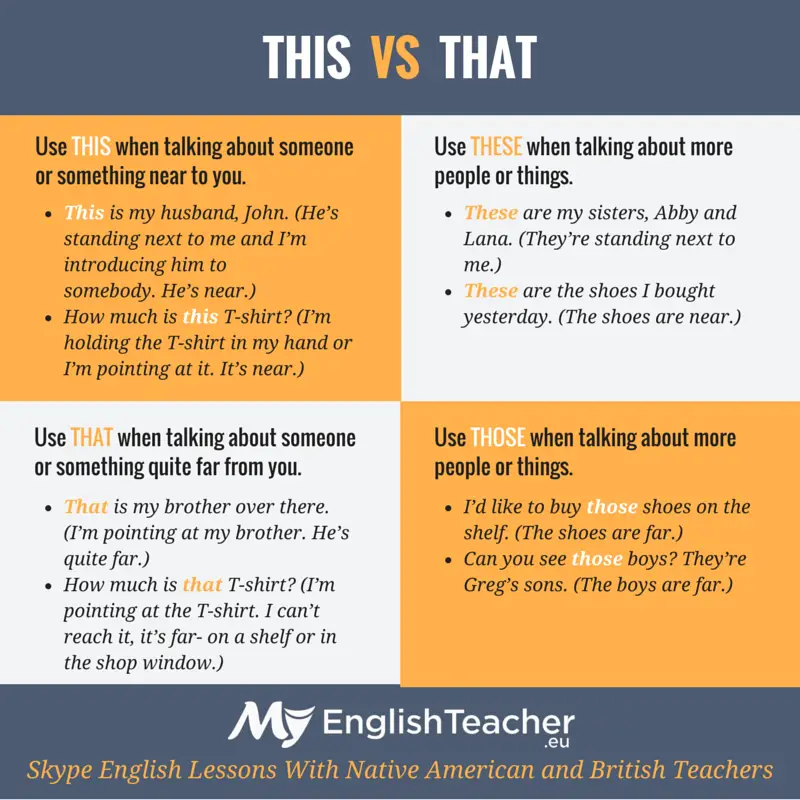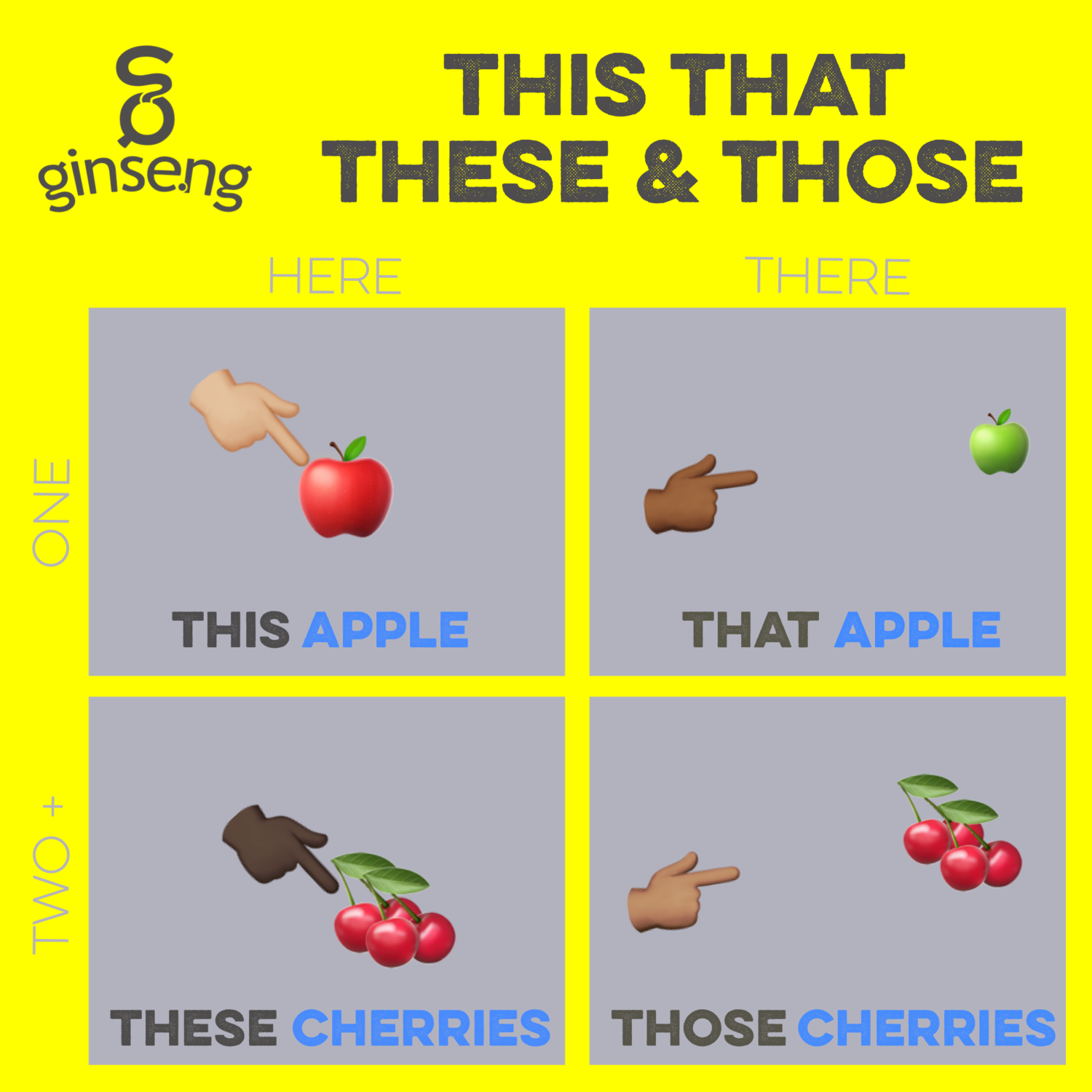
When to Use THIS (THESE) and THAT (THOSE) in English!
They vs Those - What's the difference? they | those | As pronouns the difference between they and those is that they is a group of people, animals, or objects previously mentioned while those is plural of lang=en. As determiners the difference between they and those is that they is those (used for people while those is plural of lang=en. they

Pin on Langue
1 This question already has an answer here : Those vs They vs That (1 answer) Closed 7 years ago. What is the difference between "They are bad." and "Those are bad."? What are the conditions in which you'd choose one in favor of the other. First off, I'm not sure that they aren't interchangeable.

THIS, THAT, THESE & THOSE Grammar lesson Learn the difference & quiz! YouTube
1. Remember that 'these' refers to something that is close to you, 'those' refers to something that is farther away, and 'they' refers to a group of people or things. 2. Look for clues in the sentence. If the sentence reads 'These cats are playing,' then you know that you are referring to something close by. 3. Try using the words in a sentence.

Pin de Anna Liszewska en English Grammar Lecciones de gramática, Vocabulario en ingles
When someone uses they/them as their pronouns, it means that you should refer to them with those pronouns. Even if you think the person looks like a "she" or a "he," the appropriate thing to do is to use the pronouns that a person informs you are the right ones for them. Because they/them pronouns are not gendered, you may safely assume that a.

Pin de Claret en Idioma Educacion ingles, Vocabulario en ingles, Direcciones en ingles
Here, they refers to hops, which was previously mentioned in the conversation. I would use those or these to refer to something, usually by pointing, which is either close by or far away, respectively. For example: Bill: What are those? (pointing to a pile of fresh green hops)

Ngữ Pháp Tiếng Anh 1 Bài 3 THIS, THAT, THESE, THOSE GRAMMAR 1 that this these those MAXFIT
Demonstratives demonstrative pronouns (That is nice.) a1 Reference Demonstrative pronouns: this, that, these, those This is my bag. That's Maya's computer. These are my children. Those are Tom's books. 'What's this?' 'What's this/that in English?' 'What are these/those in English?' 'Who's that?' 'That's my friend, Max.'

This, that, these, those online presentation
They and them are always used in place of plural nouns or noun groups in the third person. However the fundamental difference between the two in grammatical terms, is that they is a subject pronoun, and them is an object pronoun. 1) They. They is used to refer to the subject of a clause.

"Them" vs. "These" or "Those" in the English Grammar LanGeek
Synonym for they They - used for people. Example: They are my friends. These - used for things that are physically near to you. Example: John held out the bouquet of flowers and said, 'I bought these flowers for my mum.' Those - used for things that are physically far away from you. Example: Alice pointed at the hills and said, 'Those hills are haunted.'|One correction. Instead of "those girls.

THIS, THAT, THESE & THOSE 🤔 Grammar lesson Learn the difference & quiz! YouTube
One difference between these words lies in distance and number. If an item is close to you, you use the word this. If there is more than one item that is close to you, use these. This rule applies to time as well: current events use this. For example: This wedding was beautiful. Stop at this red light. Did you make these cookies?

This, That, These, & Those Rules How to Use and Pronounce Demonstratives English Grammar
What are their main differences? ' These ' and ' those ' are called demonstratives. They can either be determiners or pronouns. We use 'these' and 'those' to talk about things based on their position and distance. If the things are close to us, we use 'these'; and when they are far away from us, we use 'those'. 'These' and 'Those' as Determiners

These and Those English Grammar For Kids Use Of These and Those YouTube
Transcript. We use this/that/these/those to explain what we are talking about. We sometimes use them with nouns and we sometimes use them on their own. We use this (singular) and these (plural) to talk about things close to us, and that (singular) and those (plural) to talk about things at some distance away from us.

This That These Those Demonstrative Determiners Ginseng English Learn English
1 Answer Sorted by: 1 They is plural of he/she/it. You use they to refer to one group of things that have already been mentioned in the conversation: A: Are Peter and Laura coming? B: Yes, they should be here soon. <-- they means Peter and Laura Those is the plural of that.

The difference between THIS, THAT, THESE and THOSE in English. Basic English ESL Educação
Pronouns: personal ( I, me, you, him, it, they, etc.) - English Grammar Today - a reference to written and spoken English grammar and usage - Cambridge Dictionary

Them vs. These/Those When to Use Each (Examples) TrendRadars
Exceptions For "They". One exception for using "they" is when it is used as a singular pronoun to refer to a person who does not identify as male or female. For example: "They are coming to the party tonight.". In this case, "they" is used as a gender-neutral pronoun to refer to a person without assuming their gender.

There is There are Worksheet English Treasure Trove
What is the Difference Between They and Them? In this post, I will compare they vs. them. I will show you example sentences for each of these words, so you can see them in context. I will also use a memory tool that can also help you decide whether you need to use them or they in any given sentence. When to Use They Is they a pronoun?

11 Melhores Ideias De Demonstrative Pronouns Aulas De Ingles Ingles Images
When should you use "they"? You would use "they" when referring to people or things in a general sense, without specifying any particular individuals or objects. For example, "They say it's going to rain tomorrow" or "I heard they are releasing a new movie next month."